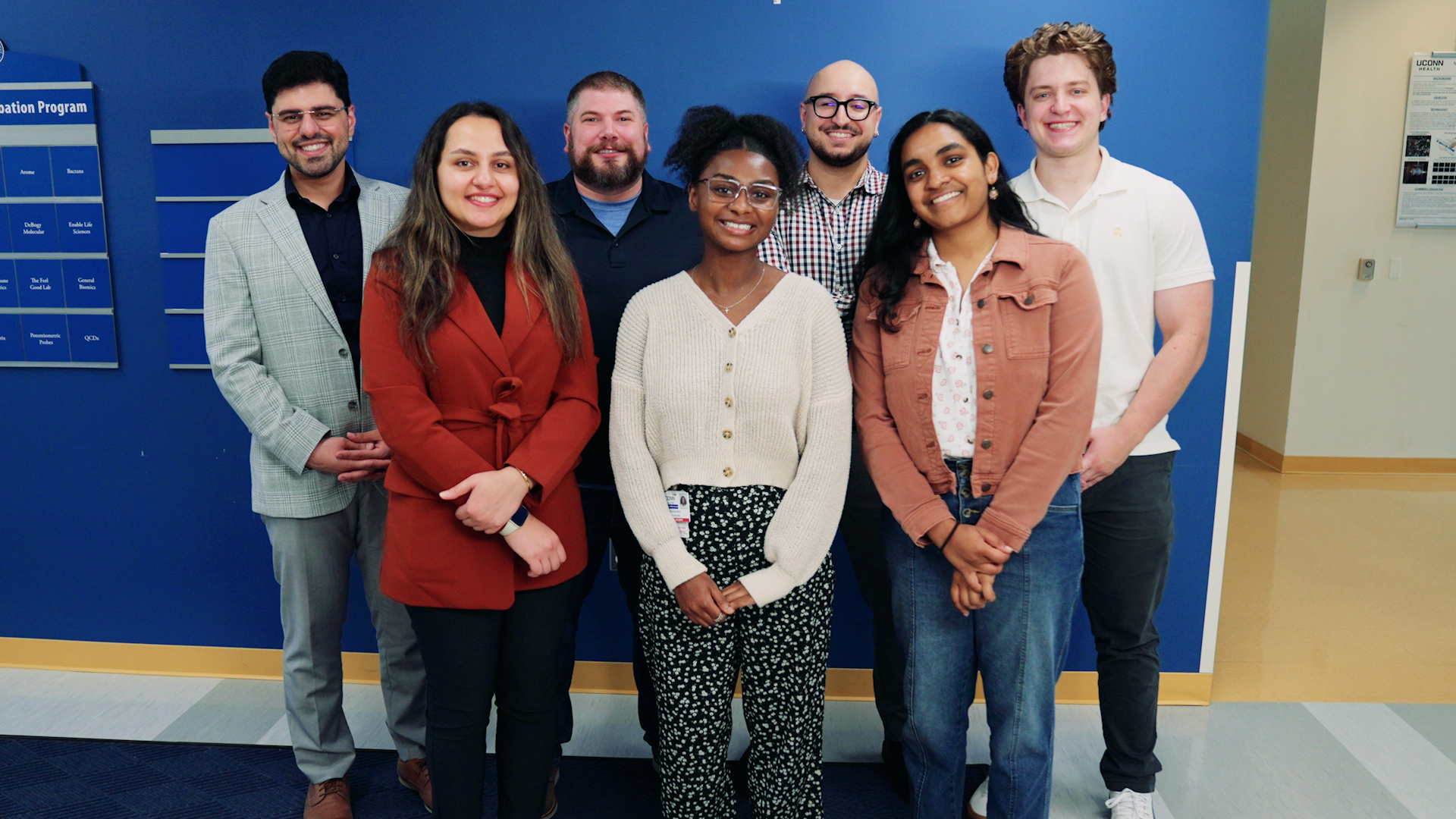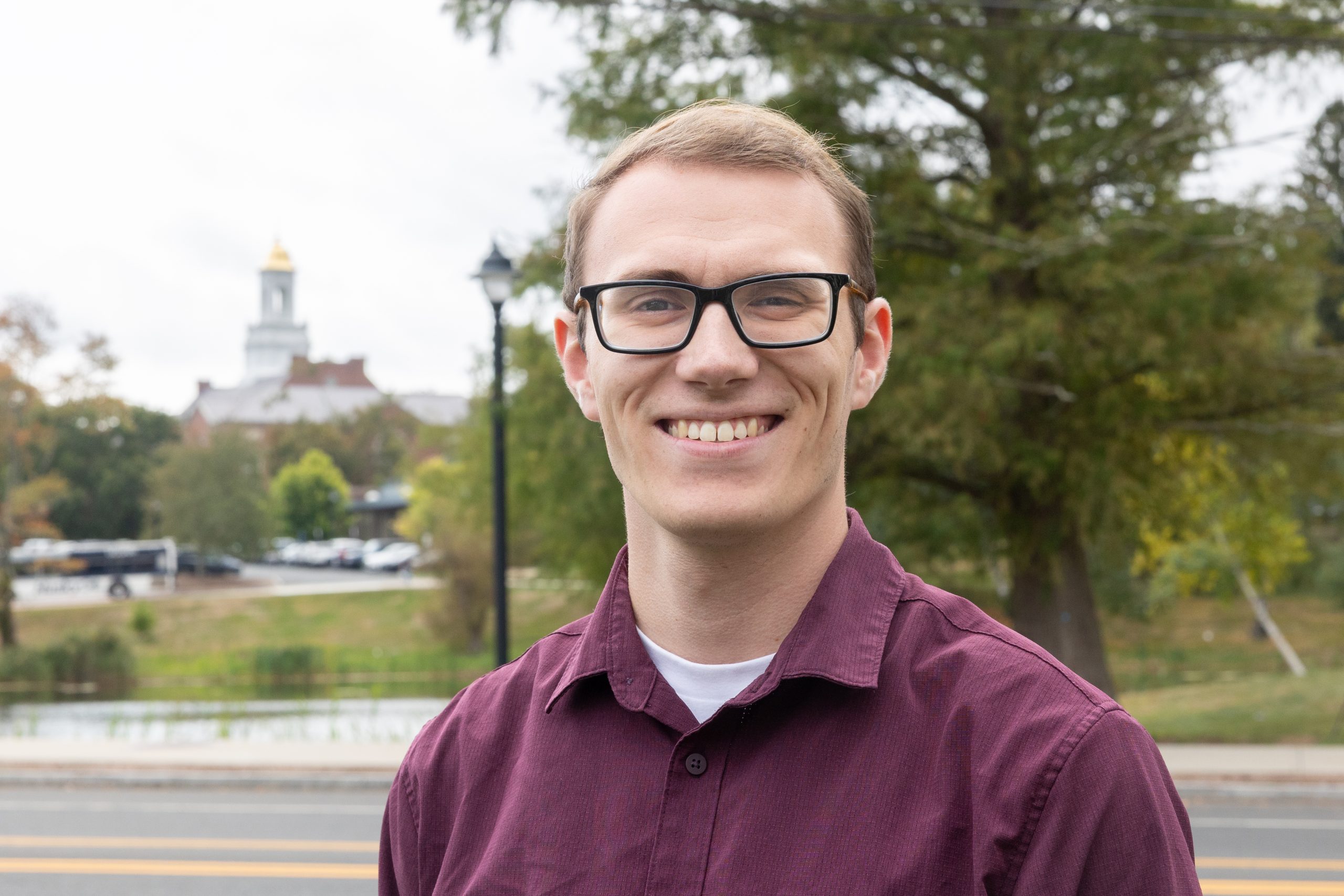UConn School of Pharmacy a Key Partner in Fight Against Opioid Epidemic Deaths in Connecticut
First, they have joined forces with the Department of Mental Health and Addiction Services (DMHAS), the Hartford Department of Health and Human Services, and other health districts to engage with the community at health fairs, Hartford and Middletown Pride events, and other events across Connecticut to train the public in identifying opioid overdoses, properly administering naloxone, and providing rescue breaths. We are also training the public to reduce the risk of overdose by training on safe medication disposal, and how to identify fentanyl using test strips. DMHAS has provided us with naloxone kits and fentanyl test strips to distribute to those we trained. From 2023 to the present, more than 1,000 people were trained and more than 1,200 naloxone nasal dispensers, test strips, and medication disposal bags were distributed across the state. Stefanie Nigro, Devra Dang, Kate Banker-Murphy, and C. Michael White are leading the efforts supported by Urban Service Track and service-learning pharmacy students.
Pharmacy student Karell Cotterell describes her motivation for participating in opioid harm reduction events at the South Park Clinic, in downtown Hartford. “The South Park Health Fair is an opportunity to hand out fentanyl test strips and naloxone kits and to show the community members how to use the products. We hope to facilitate harm reduction by empowering informed decisions and reducing the risk of drug overdose. Talking with the attendees and hearing their stories, motivates me to work on lowering negative biases of substance misuse and creating a more supportive and compassionate community.”
Nigro and several students led the training of local health department leaders at the School of Pharmacy in Storrs, CT in August 2024. She says “Training others to administer Narcan was an incredibly fulfilling experience for my students and I, underscoring the profound impact that knowledge and preparedness can have in saving lives. Equipping others with this critical skill not only enhanced their confidence but will hopefully strengthen our collective response to the opioid crisis.”
Second, there are faculty working on the national level to reduce opioid misuse risks. When tianeptine, also known as “gas station heroin”, came onto the market as a dietary supplement, Dr White presented to the National Association of State Controlled Substance Authorities (NASCSA) and Connecticut Department of Consumer Protection alerting them of the health risks, how to treat overdoses, and that tianeptine was a drug, not a supplement. This supported their efforts to remove these products from the market. White made a major media push with articles appearing in major newspapers from the Houston Chronical to the San Francisco Chronicle and to online media sources. White will be speaking at the upcoming NASCSA annual meeting in Greenville, South Carolina on October 31st about 7-hydroxymitragynine (7-OH), a new isolate of kratom that is as addictive as morphine. Only two 7-OH products were being sold last year which has ballooned to dozens of products which are being sold in gas stations and smoke shops across the country. White was also recently asked to be the inaugural chair of the Global Kratom Coalition Advisory Council, a council made up of content experts and consumers who were either helped or harmed by using the product. The council will be developing position papers that will help guide state, federal, and international regulations, policies, and procedures to make kratom use safer around the globe. White’s media work surrounding kratom in the past two years has surpassed a reach of 460 million including NBC News, National Geographic, and The Telegraph.
Third, there are faculty performing research into approaches to make opioids less likely to be misused. Nathaniel Rickles, Associate Dean of Admissions and Student Affairs, is leading FDA-funded research to test the impact of pre-packaging opioids in defined quantities on opioid prescribing, dispensing, and patient use and other outcomes. He is also leading two projects funded by DMHAS related to improving opioid safety and harm reduction activities. The first project has been ongoing since 2017 and involves training health district/department staff in conversations with clinicians across Connecticut to enhance opioid safety. Clinicians receive continuing education credit without leaving their practice sites. The second project started in 2021 and involves hybrid training (virtual lectures and in-person fieldwork) of UConn students across multiple majors in opioid harm reduction activities in health districts and departments across Connecticut. Rickles and Kristin Waters developed last year the first known accredited 8-hour certificate program in the administration of long-acting injectable medications for mental health disorders and inclusive of those for substance use disorders. This formal training program has trained over 40 pharmacists in the past year and will be offered up to 3 times annually. The goal is to support individuals with severe and persistent mental health disorders across Connecticut and beyond to enhance adherence and improve clinical outcomes and public health.
In reflection of these initiatives, Rickles highlights that “At the UConn School of Pharmacy, we strongly believe that effective and impactful community-based solutions to reduce the opioid epidemic requires training and implementation support that engages multiple partners with University resources (faculty, students and various tools) and creates sustainable and positive change in clinician and patient behaviors.”
Kathleen Adams and Kristin Waters have researched better ways to initiate therapy to treat opioid use disorder, enhancing the effectiveness of therapy and reducing the incidence of withdrawal symptoms. Adams says, “Low dose buprenorphine initiation is an alternative dosing strategy that aims to avoid prerequisite and precipitated opioid withdrawal. Approximately 80% of patients are expected to transition to buprenorphine with this technique, many with minimal or no withdrawal symptoms. This creates an opportunity to provide lifesaving pharmacotherapy to patients that otherwise would be unable to tolerate traditional buprenorphine initiation.”
Similarly, White and his research team have several published scholarly articles investigating the treatment of alcohol use disorder with psychedelics, heavy metal contamination in some kratom products, and how some marketing of kratom products (products shaped like ice cream cones or with pink hippo mascots) attracts children. White and Waters are researching non-opioid adulterants like xylazine and medetomidine that can contribute to opioid users stopping breathing. The result of this work will be to identify the best approaches when naloxone is not fully effective.
Finally, Waters currently serves as the first and only pharmacist member of the medical review committee for the Health Assistance InterVention Education Network (HAVEN). HAVEN is a voluntary, confidential program for healthcare practitioners in the state of Connecticut with chemical dependance, emotional/behavioral disorder, mental illness, or physical illness that may impact their ability to work. Pharmacists and pharmacy interns first became eligible to participate in HAVEN at the end of 2023. Waters collaborates with other members of the medical review committee each month to make determinations about items such as participants’ eligibility to enroll in or continue with HAVEN. “Allowing pharmacists and pharmacy interns in Connecticut to participate in HAVEN is a huge step in the right direction. Pharmacists are not immune to the development of substance use disorders or psychiatric conditions, so it is important that they are now eligible for HAVEN’s services.”
White, Head of the Department of Pharmacy Practice, says “I am so proud that UConn School of Pharmacy faculty and students have embraced the challenge of preventing and treating opioid misuse. I am glad to play a personal part in this critical public health endeavor as well. This is reminiscent of the work that we did when the School of Pharmacy partnered with the State Department of Public Health training paramedics, podiatrists, dental hygienists, and veterinarians across the State of Connecticut to safely give the COVID-19 vaccine at the peak of the pandemic. Connecticut was the national leader in first and second dose vaccinations and it underscores the multiplicative effect of having many community partners working toward a common goal.”
If you are part of a community organization in Connecticut dealing with a vulnerable population that would like to host a naloxone training event, please reach out to White at charles.white@uconn.edu.
Latest UConn Today
- UConn Cancer Care Startup Goes Global (and Beyond)Encapsulate, a MedTech company founded by UConn alumni, closes seed round and aims ever higher
- What Happens When Local Hospitals Stop Delivering Babies? UConn Anthropology Student is Hoping to Find Out'The goal of this project is, within the medical anthropology context, to really look at people’s lived experiences'
- UConn Magazine: UnrivaledForgive Napheesa Collier and Breanna Stewart for not gushing over the success of Unrivaled, the three on three women’s basketball league they cofounded
- New Interactive Map of Connecticut Nonprofits Rolled Out to Help With Decision-Making'Nonprofits have saved the State of Connecticut billions, not millions, of dollars. They took on some of the toughest public services'
- UConn Pharmacy Professor Running for President-Elect of the American Society of Consultant PharmacistsChristina Polomoff, Pharm.D. (‘14), associate clinical professor, is running for president-elect of the American Society of Consultant Pharmacists (ASCP). Supported by her UConn and pharmacy communities, she hopes to continue building ASCP as an innovative, inclusive home where every member thrives.
- UConn, Bridgeport Officials Announce ‘Promise’ Financial Aid ProgramTalented students from the Park City will receive financial aid for attending any UConn campus













